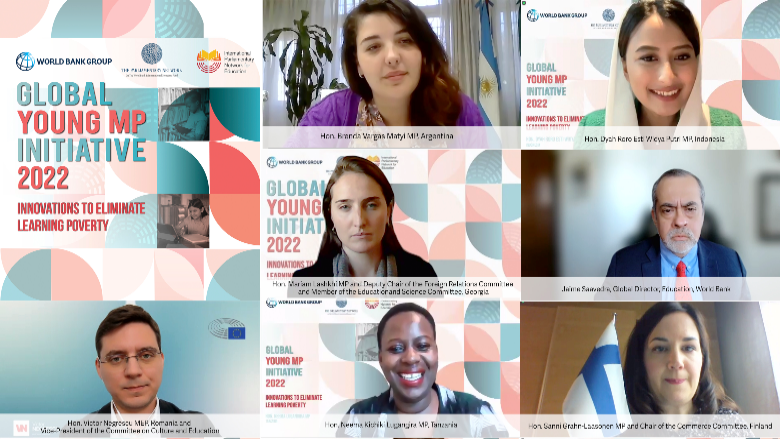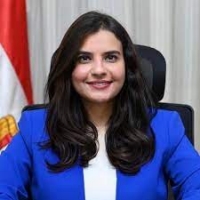In this challenging context, the third meeting of the World Bank Global Young MP Initiative gathered over 70 parliamentarians aged 40 and under from every region of the world to virtually discuss “Innovations to Eliminate Learning Poverty” on April 14, 2022, in collaboration with the International Parliamentary Network for Education (IPNED) and the Parliamentary Network on the World Bank and IMF (PN).
Young parliamentarians are uniquely positioned to understand the perspectives of younger generations who feel the brunt of these many intractable challenges, a point that World Bank Vice President of External and Corporate Relations Sheila Redzepi made during her opening remarks. Young representatives not only give the vulnerable demographic a voice in parliaments, but they bring fresh ideas and technological savvy to debates.
Throughout the meeting, moderated by Hon. Dyah Roro Esti Widya Putri MP, Indonesia, participants stressed the need for harnessing technology to extend access to education to all children. They also heard from Word Bank experts and a dynamic lineup of young parliamentarians about the current education and literacy context, best practices, and innovative solutions.
World Bank Global Director for Education, Jaime Saavedra, outlined the learning poverty landscape post-COVID, and the five-point RAPID learning recovery framework developed by the WBG, UNESCO and UNICEF to mitigate learning losses as schools reopen. He emphasized the key role that parliamentarians play in driving the political commitment behind the financial resources, technical design, and implementation necessary for change.
Seven parliamentarians from all corners of the world shared their specific national and regional challenges and approaches. Hon. Neema Kichiki Lugangira MP, Tanzania, representing IPNED, and Hon. Sahar Albazar MP, Egypt, and President of the IPU Forum of Young Parliamentarians, both highlighted key actions parliamentarians could take to improve education results.
Sharing examples from Finland, a country with high educational standards, Hon. Sanni Grahn-Laasonen, MP and Chair of Finland’s Commerce Committee, rallied her colleagues: “Education is the strongest tool for us to change the world…In times like these, being a politician requires persistence and resilience. The result of our work is often visible only later, sometimes even a decade is a short time before we can see change happen. Dear colleagues, let’s not give up. Let’s continue to fight for every child’s right to learn. An equal and fair society seeks to give opportunities for everyone to study and to shine.”
The importance of data in shaping policies and budgets was underscored by many, as was the need for collaboration at all levels – from global to local – to encourage countries, international organizations, CSOs, teachers, parents, and community members to work together in filling gaps in education.
The meeting closed with proposed innovative actions for young MPs to promote better learning outcomes, including:
increasing Education Department budgets
ensuring funding cascades to the grassroots level
greater parliamentary engagement with education authorities
training early childcare providers to improve foundational literacy and numeracy
teaching children to be innovators and employers rather than employees
high speed broadband internet coverage across countries
tele-lessons broadcasted through TV channels
a global plan to accelerate educational progress
Click here to watch the replay.


